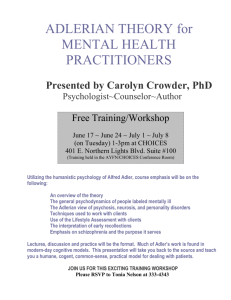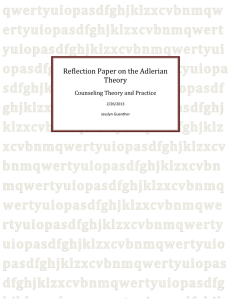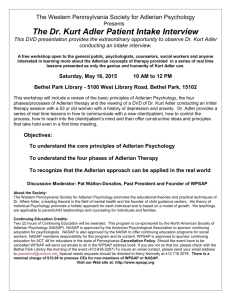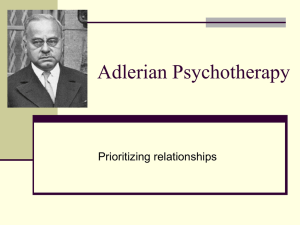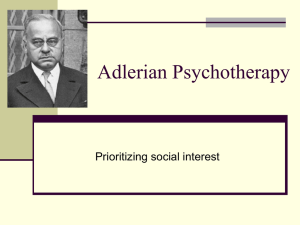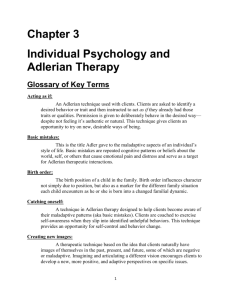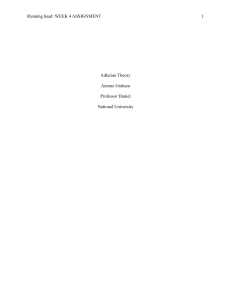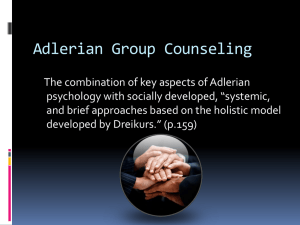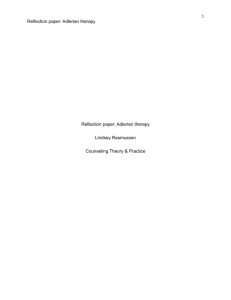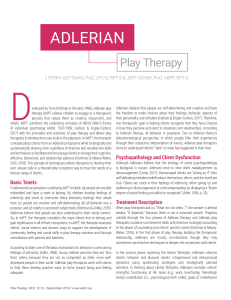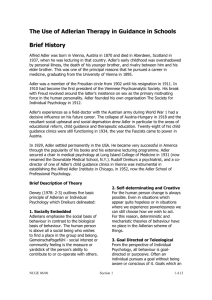File
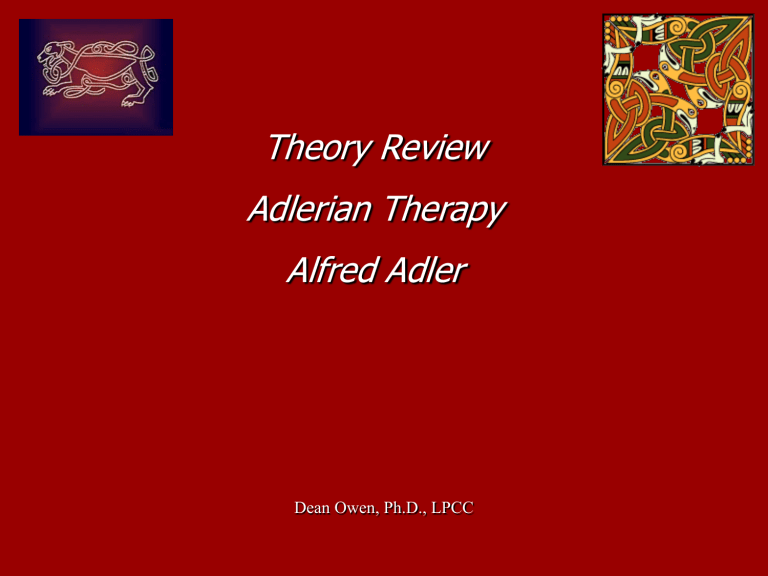
Theory Review
Adlerian Therapy
Alfred Adler
Dean Owen, Ph.D., LPCC
Usual Disclaimer
Avoid prolonged contact with skin
Not to be taken internally
No animals were harmed during the production of this presentation
After viewing this presentation avoid operating mobile or dangerous equipment
This presentation contains graphic images which some viewers may find disturbing.
Alfred Adler (1870-1937)
Alfred Adler a. trained as physician with a medical degree from the University of Vienna and initially practicing in opthamalogy.
b. Invited to join the Wednesday Society
( Mittwochsgesellschaft) discussion groups with S. Freud, he later separated to begin his own “school” of psychotherapy.
c. Suffered from rickets and did not learn to walk until the age of 4 years.
d. Born the third child and second son of a
Jewish grain merchant in Vienna, birth order and inferiority were to become principle ideas in his theory.
Adlerian Therapy
Key Figure and Major Focus: Alfred Adler:
Significant developer: Rudolf Dreikurs.
Individual Psychology (a term Adler used to describe his emphasis on the uniqueness and unity of the individual) began in Europe during
The early 1900’s under Adler’s leadership.
Dreikurs was the main figure responsible for bringing this form of therapy to America,
Especially applying these principles to education, child guidance, and group work.
Adlerian Therapy
Philosophy and Basic Assumptions: Adler stresses social psychology and a positive view of human nature. He views human beings as being influenced more by social than by biological forces. People are in control of their fate, not victims of it. Individuals create a distinctive lifestyle at an early age, rather than being merely shaped by childhood experiences. This lifestyle tends to remain relatively constant and defines one’s beliefs about life and ways of dealing with tasks.
Lifestyle:
An individual’s core beliefs and assumptions
The aggregate of our one’s perceptions about self, others, and the world.
One’s way of thinking, acting, feeling, living, and striving toward goals…
It contains much of what we now call “one’s personality”…..
Adlerian Therapy
Key Concepts:
Consciousness, not unconsciousness, is the center for personality.
The Adlerian approach, based on a growth model, stresses the individual’s positive capacities to live fully in society. It is characterized by seeing unity in the personality, understanding a person’s world from a subjective vantage point , and stressing life goals that give direction to behavior.
Humans are motivated by social interest, or a sense of belonging and having a significant place in society.
Feelings of inferiority often serve as the wellspring of creativity, motivating people to strive for mastery, superiority, and perfection.
Subjective vantage point: Adler was among the first to argue the importance of viewing the world through the “spectacles” of the client.
Adlerian Therapy
Therapeutic Goals: Adlerians are mainly concerned with helping clients identify and change their mistaken beliefs about self, others, and life.
Working cooperatively with clients, therapists provide encouragement so that clients can develop socially useful goals.
Some specific goals include fostering social interest, helping clients overcome feelings of discouragement changing faulty motivation restructuring mistaken assumptions and assisting clients to feel a sense of equality with others.
Adlerians focus on reeducating individuals and reshaping society.
Adlerian Therapy
Therapeutic Relationship
Client-therapist relationship is based on mutual respect
Both client and counselor are active.
Clients are not viewed as passive recipients; rather, they are active parties in a relationship between equals.
The focus is on examining the client’s lifestyle, which is expressed in everything that the client does. Therapists frequently interpret this lifestyle by demonstrating a connection between the past, the present, and the client’s future strivings. Without initial trust and rapport, and sustained attention on the quality of the therapeutic relationship, the difficult work of changing one’s style of living is not likely to occur.
Adlerian Therapy
Therapeutic Process
1. Form the therapeutic alliance
2. Lifestyle assessment (understanding dynamics)
3. Identification of mistaken goals or assumptions
4. Re-education of the client toward a useful life.
Adlerian Therapy
Techniques and Procedures:
Practitioners typically begin the counseling process with a lifestyle assessment, which focuses on the family constellation and early recollections. Information gained from this comprehensive assessment guide the therapy process.
A strength of Adlerian therapy is the variety of cognitive, behavioral, and experiential techniques that can be applied to a diverse range of clients in a variety of settings and formats. Therapists are not bound to follow a specific set of procedures; rather, they can tap their creativity by applying those techniques that they think are most appropriate for each client.
Some of the specific techniques include empathic attending, encouragement, confrontation, the question, summarizing, interpretation of the family constellations, exploration of early recollections, suggestion, and homework assignments.
Adlerian Therapy
Applications : As a growth model, Adlerian theory is concerned with helping people reach their full potential. Its principles have been applied to a broad range of human problems and to alleviating social conditions that interfere with growth. The theory has been applied in areas including education, parent education, couples counseling, family counseling, and to group therapy. Since it is grounded in principles of social psychology it is ideally suited for work with groups, couples and families.
A time limited framework can be applied to all forms of Adlerian therapy.
Adlerian Therapy
Applications : Characteristics associated with Adlerian brief group counseling include initial establishment of a therapeutic alliance, identifying target problems, and goal alignment, rapid assessment, active and directive inventions, a focus on strengths of groups members and an emphasis of both the past and the present. This time limited framework conveys the expectation to group members that change will occur in a short period of time. Groups provide an ideal context for member to explore how their family-of-origin experiences have current influences on their lives.
Adlerian Therapy
Contributions : Adler founded one of the major humanistic approaches to psychology and his ideas have been integrated into many other forms of therapy. The model is a forerunner of most current counseling approaches.
Adlerian therapy has a psycho-educational focus, a present and future orientation, and is a brief and time limited approach. Adler’s influence has extended to the community mental health movement.
Adlerian Therapy
Some questions…
How does one create the proper therapeutic relationship?
How would assess a client’s lifetyle?? What things would you include in the discussion?
What role does insight play in therapy?
How would you go about re-educating or re-orienting a client????
